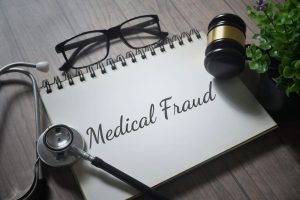 According to the Centers for Medicare and Medicaid Services, Medicare fraud cost taxpayers over $25 billion in 2020 alone. Whistleblowers play an essential role in identifying and preventing instances of Medicare fraud and abuse and may receive generous financial rewards for their bravery. If you believe you have evidence of Medicare fraud, a Medicare fraud whistleblower lawyer in Chicago can help you protect your rights and increase the chances of a successful whistleblower lawsuit.
According to the Centers for Medicare and Medicaid Services, Medicare fraud cost taxpayers over $25 billion in 2020 alone. Whistleblowers play an essential role in identifying and preventing instances of Medicare fraud and abuse and may receive generous financial rewards for their bravery. If you believe you have evidence of Medicare fraud, a Medicare fraud whistleblower lawyer in Chicago can help you protect your rights and increase the chances of a successful whistleblower lawsuit.
At Wallace Miller, our lawyers help whistleblowers expose fraud and other unethical business practices. Contact us today for a free legal consultation and learn more about how our conspiracy and fraud lawyers can help you shed light on shady business practices.
What Is Medicare Fraud?
Medicare fraud involves various illegal activities, including false billing, kickbacks, and other deceptions intended to defraud the federal government’s Medicare program. Fraudulent schemes range from providing unnecessary services or treatments to obtaining funds for services never provided. Medicare fraud costs taxpayers billions annually, puts patients at risk, and undermines the Medicare system’s integrity. Medicare fraud carries both civil and criminal penalties for those found guilty.
By blowing the whistle on fraudulent activities, whistleblowers, or those who report fraud under the False Claims Act, help protect public funds and bring attention to illegal business practices. Reporting suspicious activities also helps hold healthcare providers accountable for their actions and protects taxpayer dollars.
Types of Medicare Fraud
Medicare fraud involves individuals and organizations misusing Medicare funds for their own profit. It takes many forms, from falsifying claims to providing unnecessary services or treatments. Common types of Medicare fraud include:
- Billing for unnecessary services or equipment: Unnecessary billing is one of the most common forms of Medicare fraud. This form of fraud occurs when a healthcare provider bills for services or supplies a Medicare beneficiary did not receive.
- Upcoding: Upcoding involves billing Medicare for services at a higher rate than those provided. For example, if a provider billed for a more expensive procedure than they performed, this is considered upcoding.
- Unbundling: Unbundling occurs when a healthcare provider submits multiple claims for separate components of a procedure instead of submitting one claim for the entire procedure. By unbundling, healthcare providers collect more money from Medicare than they would if they submitted the bundled claim.
- Falsifying patient records: Providers may falsify patient records in an attempt to receive payment for services not provided. Falsifying patient records includes adding false diagnoses, treatments, or procedures to patient records.
- Prescription drug fraud: Prescription drug fraud occurs when healthcare providers bill Medicare for expensive prescription drugs when they prescribe generic drugs. It also involves providing medications not covered by Medicare or prescribing unnecessary medications for a patient’s care.
- Kickbacks: A kickback is when a healthcare provider offers something of value in exchange for referrals. The practice of providing kickbacks is illegal under the federal Anti-Kickback Statute.
- Double-billing: Double-billing involves submitting two separate bills for the same service or procedure.
- Deceptive marketing practices: Some providers use deceptive marketing practices to attract patients and entice them into signing up for certain services or treatments.
What is a Whistleblower Lawsuit?
A whistleblower lawsuit refers to a civil suit brought by an individual against a person or company for fraudulently obtaining money from the government. Also referred to as a qui tam lawsuit, whistleblowers bring these claims under the federal False Claims Act (31. U.S.C., Section 3729), which allows private citizens to act on behalf of the government to combat fraud, waste, and abuse.
In a qui tam action, the whistleblower (also called the qui tam relator) initiates the lawsuit on the government’s behalf and receives a portion of any settlement or judgment if successful. The damages recovered can be substantial, depending on the circumstances of the case. By filing a qui tam lawsuit, the relator helps expose fraud and protect taxpayers’ money.
What Is the Reward for Reporting Medicare Fraud?
Whistleblowers provide an essential social service by shedding light on otherwise undetected criminal activity. Individuals who bring a case under the False Claims Act (FCA) may receive between 15 and 25 percent of whatever funds the government recovers. If the government does not intervene in the litigation, the whistleblower may receive a higher share of 25-30 percent of the amount recovered. The total amount of the reward depends on many factors, such as the amount recovered and the whistleblower’s attorney’s experience. Seeking legal counsel helps ensure you get the best possible result.
 How to Report Medicare Fraud
How to Report Medicare Fraud
The best way to report Medicare fraud is to contact a qualified attorney experienced in whistleblower cases. As soon as you suspect any fraudulent activity, write it down and describe the event in detail.
Before taking legal action, gather as much documentation as possible supporting your claim without violating company policies or procedures. To ensure you have all the necessary documents supporting your claim, list all fraud-related documents you still need, including financial statements, invoices, emails, and other correspondence. This information helps make the reporting process smoother and more efficient.
Federal and State Whistleblower Laws
The federal False Claims Act is essential for combating fraud in Medicare and other federally funded programs. It empowers individuals to file suit on behalf of the government and obtain a reward if the case is successful.
The federal Anti-Kickback Statute (AKS) prohibits any entity or person from making or accepting payment as a reward for recommending, arranging, or referring to federally funded medical services. This law helps prevent fraud and abuse by ensuring that financial incentives do not drive payments for these services.
The Stark Law is another federal law prohibiting physicians from referring patients to an entity for designated health services if the physician has a financial relationship with that entity. This law prevents physicians from profiting from their own referrals, leading to unnecessary services or services of lesser quality.
The Illinois False Claims Act allows a whistleblower with knowledge of fraud committed against the state to file a lawsuit on behalf of the state and share in any settlement or judgment. The Illinois False Claims Act covers actions including:
- Knowingly submitting a false claim for payment by Illinois;
- Making or using a false record or statement to get your claim paid by Illinois;
- Conspiracy to commit these acts; and
- Making or using a false record to avoid repaying the state.
Any person or entity who commits fraud against the state of Illinois may face penalties up to $11,000 for each false claim and three times the amount of damages sustained by the state.
Medicare Fraud in Illinois
In 2022, the owner of a Chicago home healthcare company received a year in federal prison for fraudulently billing Medicare for over $1.2 million. Also in 2022, Illinois-based pharmaceutical company Akorn Operating Co. agreed to pay $7.9 million to settle a whistleblower claim regarding Medicare fraud. The year before, a Chicago woman received a sentence of 56 months in prison and was ordered to pay $6.3 million in restitution for her role in a conspiracy to commit health care and wire fraud.
How a Medicare Fraud Whistleblower Lawyer Can Help
You might receive a significant reward if you report fraud or abuse of Medicare funds in Illinois. A whistleblower lawyer helps whistleblowers understand their rights and the potential benefits of filing a qui tam claim. A Medicare fraud whistleblower lawyer can help in many ways, including:
- Analyze your claim: A Medicare fraud whistleblower lawyer assesses the facts of your case and determines if your claim meets the requirements of the False Claims Act.
- File a complaint: If the investigation reveals fraud, the lawyer will prepare and file the qui tam complaint on your behalf.
- Represent your interests: After filing the complaint, a lawyer represents your interests throughout the case, including representing you in court hearings and working with the government to negotiate any potential reward.
- Maximize your award: A whistleblower lawyer also works to maximize your award. Depending on the size of the fraud and the government’s involvement, awards range from 15-30% of the total damages recovered.
- Protect your rights: The False Claims Act protects whistleblowers from retaliatory action taken by their employers. A whistleblower lawyer helps you enforce these rights if necessary.
By enlisting the help of a Medicare fraud whistleblower lawyer, you can increase your chances of obtaining a financial reward for reporting fraud in Illinois. In addition, your lawyer will provide experienced guidance throughout the process and ensure your interests are protected.
Speak With a Chicago Medicare Fraud Whistleblower Lawyer
If you have evidence of Medicare fraud and are considering filing a whistleblower claim, contact Wallace Miller. Our experienced Chicago Medicare fraud whistleblower lawyers can help you explore your rights and options for protecting yourself and reporting the fraud. We understand the complexities of whistleblower cases and will use our experience and knowledge to provide you with the best possible legal representation. Contact us today by calling (312) 261-6193 and discuss your case with a qualified Medicare fraud lawyer in Chicago.


 How to Report Medicare Fraud
How to Report Medicare Fraud